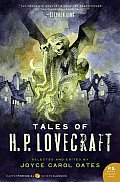 Even though I'm not supposed to be buying books for myself, I did pick up one during this latest blog-neglecting period. When I was book shopping for my nieces and nephews (a post on that topic coming soon) I happened across this deeply discounted title: Tales of H.P. Lovecraft, introduced and selected by Joyce Carol Oates. Now that we (finally) have a copy of Arkham Horror, a board game built around H.P. Lovecraft's Cthulhu Mythos, I felt it was high time that both Russell and I read Lovecraft's work (and I love the cover art). I also figure that I might as well share my thoughts on the individual stories on the blog. So far I've read the first three.
Even though I'm not supposed to be buying books for myself, I did pick up one during this latest blog-neglecting period. When I was book shopping for my nieces and nephews (a post on that topic coming soon) I happened across this deeply discounted title: Tales of H.P. Lovecraft, introduced and selected by Joyce Carol Oates. Now that we (finally) have a copy of Arkham Horror, a board game built around H.P. Lovecraft's Cthulhu Mythos, I felt it was high time that both Russell and I read Lovecraft's work (and I love the cover art). I also figure that I might as well share my thoughts on the individual stories on the blog. So far I've read the first three.The stories included in Tales of H.P. Lovecraft are supposedly his major works. I'm not sure if the stories are arranged chronologically or with any rhyme or reason and I don't remember reading anything about that the arrangement in the volume's introduction.
Joyce Carol Oates' Introduction (9.5 pages)
I appreciated getting a bit more biographical information about Lovecraft. What a horrible, horrible mother he had. JCO references many writers while placing Lovecraft in the context, explains the Cthulhu Mythos and its origins, identifies the overlap of Lovecraft's imaginary geography with areas in the Northeast United States, and outlines reader response. However some of the most interesting bits of the essay aren't specific to Lovecraft and his work.
JCO on the difference between genre and literary fiction:
Readers of genre-fiction, unlike readers of what we presume to call "literary fiction," assume a tacit contract between themselves and the writer: they understand that they will be manipulated, but the question is how? and when? and with what skill? and to what purpose? However plot-ridden, fantastical or absurd, populated by whatever pseudo-characters, genre-fiction is always resolved, while literary fiction makes no such promises; there is no contract between reader and write for, in theory at least, each work of literary fiction is original, and, in essence, "about" its language; anything can happen, or, upon occasion, nothing. Genre fiction is addictive, literary fiction, unfortunately is not. (xiii)Nostalgia: "To love the past, to extol the past, to year in some way to inhabit the past is surely to misread the past, purposefully or otherwise; above all, it's to select from the past only those aspects that accommodate a self-protective and self-nourishing fantasy" (xi).
"The Outsider" (5+ pages)
Even though I'm pretty sure that I had not previously read any Lovecraft, I was struck with profound sense of déjà vu when reading "The Outsider." A disappointing start to the collection, short with its surprise ending so obviously that even twist seems inappropriate.
"The Music of Erich Zann" (7 pages)
A bit creepier, but the framed narrative gives the reader a bit too much distance.
"The Rats in the Walls" (16 pages)
Finally a really good ending. "The Rats in the Walls" gave me hope for both Lovecraft and this volume.

I have to admit that I haven't read much of the Lovecraft that is out there. I have a bunch on compilations on the shelf and should give them a try again. Of the different stories I have read, The Colour Out of Space and At the Mountains of Madness were the most memorable. Have fun! :)
ReplyDeleteIt looks like those two are in my collection. I'll look forward to them!
ReplyDelete